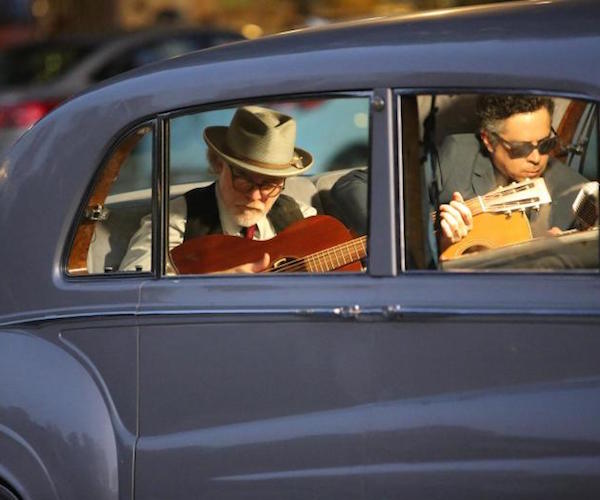Film Commentary: “The King” and The King
Eugene Jarecki’s ramshackle, occasionally provocative, and frequently entertaining documentary on Elvis Presley gets some things wrong.

A scene from Eugene Jarecki’s “The King.”
By Ken Bader
By his own admission, director Eugene Jarecki wasn’t sure what he’d find when he drove Elvis Presley’s 1963 Rolls Royce from Tupelo, Mississippi to Memphis to Hollywood to Las Vegas to New York, with frequent stops in between. Those who go along for part of the ride include John Hiatt, Emmylou Harris, and the Stax Academy All Stars; talking heads such as Chuck D, Mike Myers, and Peter Guralnick also contribute their thoughts. Jarecki was searching for a greater meaning to Elvis’s life, one that would tie the King’s rise and fall to that of America and, specifically, the American Dream, which the boy from Tupelo embodied. That, in The King, Jarecki failed to connect the dots convincingly does not detract from this ramshackle, occasionally provocative, and frequently entertaining documentary. However, in an effort to gin up yet another thought piece about what Elvis Presley really meant, Jarecki introduces several longstanding accusations against the singer, accusations that require a rebuttal:
Elvis never spoke out against the Vietnam War, unlike other celebrities.
In The King, we hear the following excerpt from Elvis’s 1972 news conference in New York:
Media – “You were in the Army and were drafted. What is your opinion of war protesters? And would you today refuse to be drafted?”
EP – “Honey, I’d just soon to keep my own personal views about that to myself. ‘Cause I’m just an entertainer and I’d rather not say.”
Media – “Do you think other entertainers should also keep their views to themselves?”
EP – “No. I can’t even say that.”
That answer (save the “Honey”) has held up better over time than many other celebrity opinions about the war. Elvis was apolitical…it’s as simple as that.
Elvis was great only in the ‘50s and during his 1968 “Comeback Special.”
Jarecki needed to simplify his narrative to make it more applicable to his Elvis-as-America metaphor. But Elvis’s career was more complicated. Of course, his movies and soundtracks of the 1960s were awful, and his 1970s decline was pathetic. But give the man his due: towering performances such as “It’s Now or Never” (1960) and “Suspicious Minds” (1969) spanned the ‘60s, and the first few years of the ‘70s found Elvis in peak form vocally and physically, as you can hear on the landmark album, Elvis Country (I’m 10,000 Years Old).
Elvis was only in it for the money.
Born in poverty, Elvis was happy to become a millionaire by the age of 21. But money does not seem to have been his driving force or even something he gave much thought to. His manager, Colonel Tom Parker, on the other hand, used his sole client as a cash register, collecting 50% of revenues and maximizing Presley’s earnings at the expense of his integrity at every turn.
Elvis was a racist.
Nothing could be further from the truth. Musically, Elvis gave full credit to the black artists who influenced him:
“Let’s face it, nobody can sing (rhythm and blues) like colored people. I can’t sing it like Fats Domino can. I know that.”
“(Blues singer Arthur Crudup) used to “bang his box the way I do now, and I said if I ever got to the place where I could feel all old Arthur felt, I’d be a music man like nobody ever saw.”
But Elvis went further than expressing his appreciation for black musicians. In his early years, two African-American newspapers praised Elvis as a “race man.” One reported in 1956 that Elvis “cracked Memphis’s segregation laws” by attending the Memphis Fairgrounds “during what is designated as ‘colored night.’” That same year, Elvis also attended the otherwise segregated WDIA Goodwill Revue, a charity show put on by the self-described “Mother Station of the Negroes.” Elvis’s lack of racial prejudice was all the more remarkable when one considers where and when he was raised.
Elvis stole black music.
Elvis didn’t “steal” music from Arthur Crudup and Ray Charles any more than Duke Ellington “stole” from Debussy and Ravel. The music was out there, and Elvis loved it. The reason he’s been singled out for cultural appropriation seems to be that Elvis didn’t merely sing blues-based material, as did Frank Sinatra, Tony Bennett, and nearly every important white singer before him; Elvis captured the feeling of black music. There’s no denying the fact that worthy black musicians were consistently victimized by corporate and public racism. But to lay the blame on Elvis has always struck me as unfair.
Don’t get me wrong. The King includes a wide diversity of views. In fact, it would have moved more effectively had it dropped some of its commentators. For example, Dan Rather had nothing of value to say, and Ethan Hawke’s story of Elvis’s first recording at Sun Records differed unconvincingly from the accounts of those present at the creation. The King’s reach may exceed its grasp, but, then again, so all too often did the King’s.
Ken Bader has been a writer, editor, and producer for NPR and WBUR, WGBH, and other public radio stations. His credits include a documentary about Elvis Presley for the Voice of America. He admits that he’s old enough to remember watching Elvis on “The Ed Sullivan Show.”
